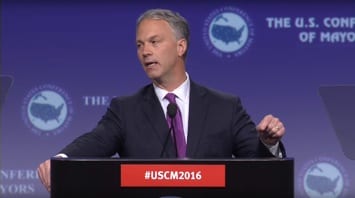Who is a member?
Our members are the local governments of Massachusetts and their elected and appointed leadership.
 At the U.S. Conference of Mayors annual meeting in Indianapolis on June 24, New Bedford Mayor Jon Mitchell received first place in the small city category for the 10th Mayors’ Climate Protection Awards.
At the U.S. Conference of Mayors annual meeting in Indianapolis on June 24, New Bedford Mayor Jon Mitchell received first place in the small city category for the 10th Mayors’ Climate Protection Awards.
Selected by an independent panel of judges from a pool of applicants, according to a release from the organization, the Conference of Mayors cited New Bedford’s leadership in solar and wind energy.
New Bedford has more installed solar capacity per capita than any city in the nation, cutting the city’s utility costs by almost $1 million, and is the staging ground for future offshore wind energy projects, the organization said in announcing the award.
“In no area – arguably at least – is the shift of power, action and ideas from the federal level down to the municipal level more evident or better illustrated than in the area of renewable energy,” Mitchell said in accepting the award. “Twenty years ago, nobody would have predicted that today, American energy policy and climate change policy would have been driven and implemented in large part at the municipal level, but it’s happening.”
One of the key elements driving the city’s energy policy has been the creation and support of its own Energy Office, according to Mitchell’s Chief of Staff Neil Mello.
New Bedford created the office, currently led by Scott Durkee, previously a Department of Energy Resources employee, using federal fiscal stimulus funding.
Mitchell’s administration then empowered the office by having it report directly to the mayor’s office and chief financial officer, while adding additional staff. Rehiring a CFO – the city’s first in seven years – was also a critical component to make sure the city’s energy policies and projects would pay off, Mello said.
“The [solar] program is fairly complex and it’s important for municipalities to have internal capacity to effectively engage not only with state regulators, but our development partners,” Mello said.
Those private sector partners include Siemens, BlueWave Capital, SunEdison and ConEdison, and they highlight another key and innovative approach to solar energy in New Bedford. Rather than pursuing a request for proposals for a single solar developer and operator at a particular location, New Bedford did an RFP process that envisioned a longer, partnership, not specific to one location, that would encompass many kinds of solar projects over time, Mello said.
That led to the selection of BlueWave, a renewable project development company, which acted as a bridge to finding good owner-operators for solar arrays, Mello said.
Then, rather than the common smaller arrays seen on municipal building rooftops, New Bedford partnered with its Redevelopment Authority to find locations suitable for large scale arrays.
Because the Redevelopment Authority has its own solar cap, separate from the city’s, New Bedford is able to effectively exceed its own cap and has 16 megawatts worth of solar projects, Mello said.